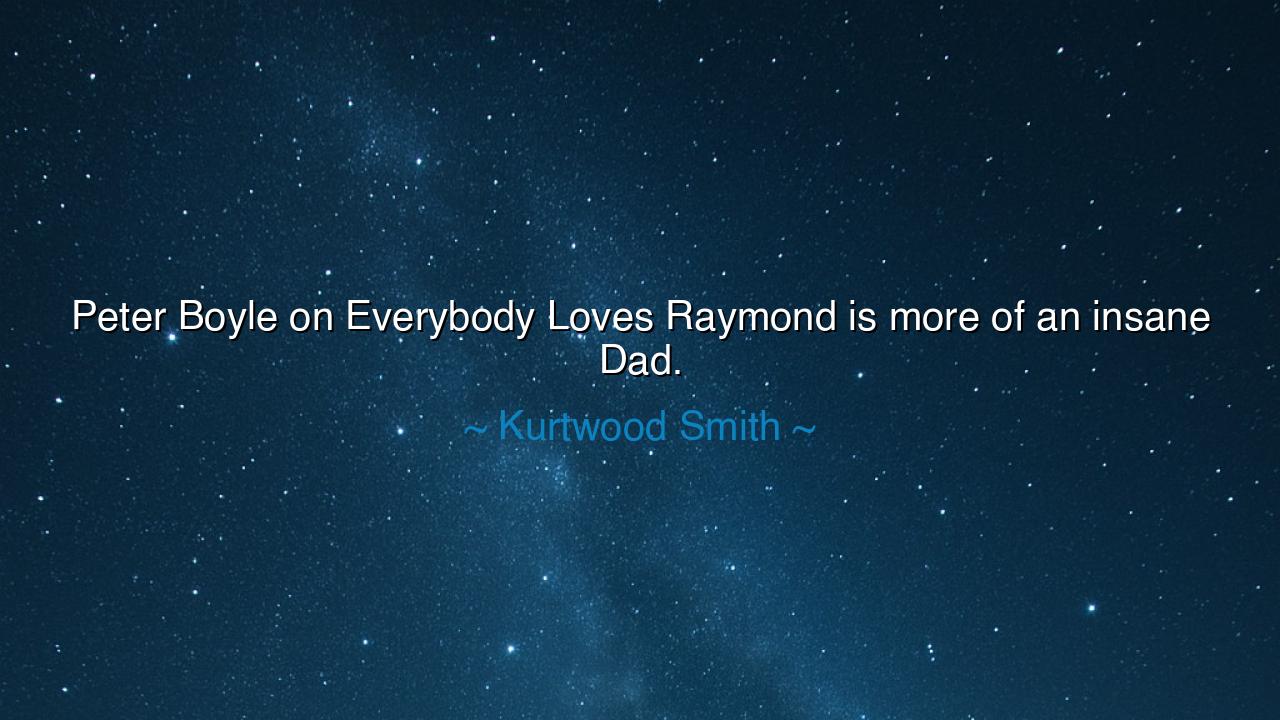
Peter Boyle on Everybody Loves Raymond is more of an insane Dad.






Hear, O seekers of laughter and wisdom, the words of Kurtwood Smith, who said: “Peter Boyle on Everybody Loves Raymond is more of an insane Dad.” Though spoken in jest, this statement carries a hidden reflection upon the nature of fatherhood, character, and the delicate balance between madness and love that defines family life. For in the comedy of the everyday lies the truth of the human soul, and in the humor of the father’s flaws, we glimpse both his burden and his devotion.
When Smith speaks of Peter Boyle as “an insane Dad,” he refers not merely to a character on a television screen, but to the timeless archetype of the father whose passion, stubbornness, and eccentricity become the axis around which his family turns. Boyle’s portrayal of Frank Barone, loud yet loving, irrational yet protective, embodies the chaotic tenderness that has defined fathers through the ages. In calling him “insane,” Smith recognizes the paradox—that the father’s madness is not cruelty, but intensity; not malice, but an unfiltered form of care expressed through imperfection.
In every generation, fathers have been both the pillars and the puzzles of family life. They labor, they command, they err, and they love fiercely in ways that are not always gentle. The “insane Dad” is not an aberration of comedy—it is a reflection of reality. The ancient playwrights understood this well: in the plays of Aristophanes and the tales of Homer, fathers are often blustering, prideful, and maddening, yet beneath their flaws burns the sacred duty of protection. The laughter they provoke is not mockery, but forgiveness—a way for families to endure the tempest of human imperfection.
Consider the story of King Lear, who, in his pride and folly, banished the daughter who loved him most. His descent into madness was not born of evil but of love misdirected, of a father’s inability to distinguish loyalty from flattery. Like Boyle’s comic portrayal, Lear’s “insanity” revealed the truth that love, when stripped of wisdom, becomes both painful and profound. The madness of fathers—whether in tragedy or comedy—is but the storm that hides their yearning to connect, to teach, to guide, and sometimes to be understood.
Smith himself, known for his role as Red Forman in That '70s Show, understood this intimately. His own character, like Boyle’s, was a father whose sternness concealed affection, whose gruff voice guarded a heart of constancy. When he calls Boyle “more insane,” it is an acknowledgment of the spectrum of fatherhood—that each man, in his way, expresses love through his own balance of reason and madness. The “insanity” becomes a language—a rough, imperfect way of saying, “I care, though I do not always know how to show it.”
The deeper wisdom in this quote lies in its gentle reminder that family love is not tidy. It is noisy, contradictory, and often absurd. Yet it is within this seeming chaos that bonds are strengthened. The laughter drawn from such portrayals—be it from Boyle’s Frank Barone or Smith’s Red Forman—does not ridicule fathers; it redeems them. It tells every son and daughter that love may wear the mask of irritation, but its heart is steadfast.
Let this, then, be the lesson to all who dwell in family and community: do not demand perfection in love. Embrace the flawed, the fiery, and even the foolish expressions of care that come your way. For as humor teaches, it is through imperfection that we connect most deeply. The “insane Dad” is not to be mocked but honored—for in his loudness is loyalty, and in his madness, meaning.
Thus, the words of Kurtwood Smith endure as both humor and hymn: a celebration of the imperfect fathers who, through their “insanity,” remind us of our shared humanity. For in laughter, as in love, the line between madness and greatness is thin—and it is often the laughter that saves the family from breaking apart.






AAdministratorAdministrator
Welcome, honored guests. Please leave a comment, we will respond soon